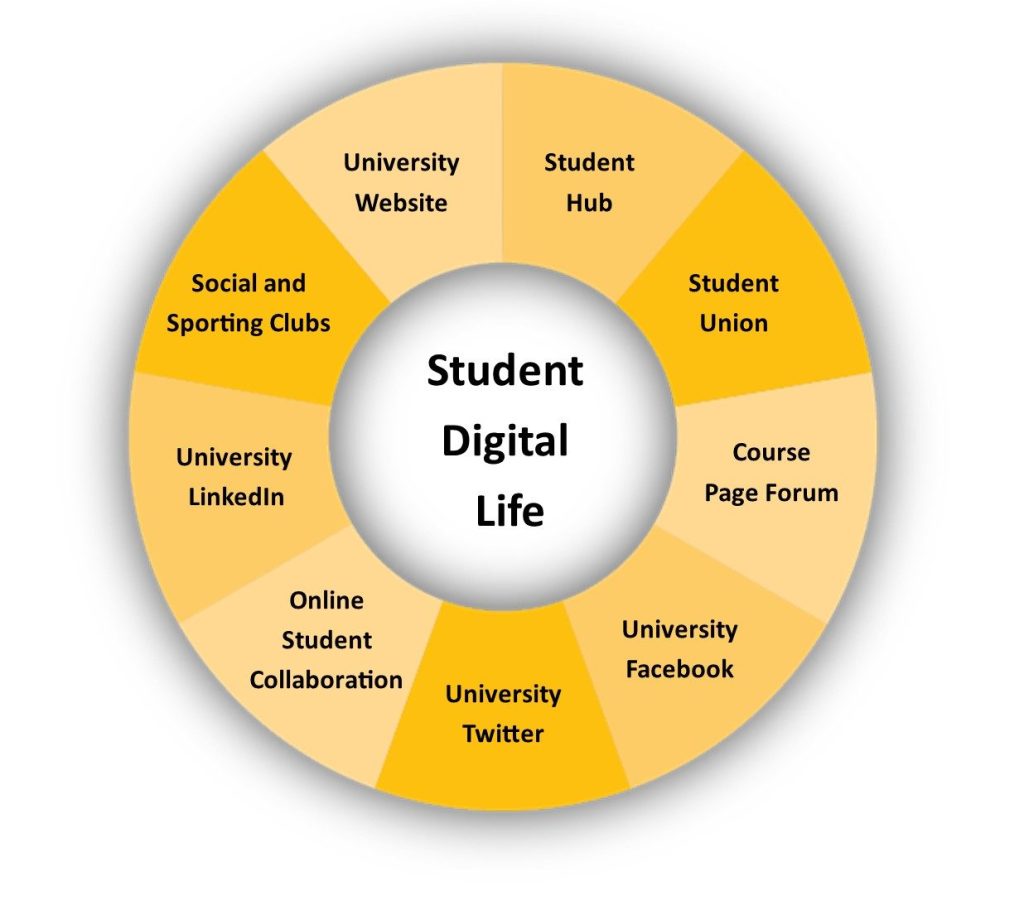9 University Life Online
Marjorie Jeffers; Yvonne Rose; Karanpal Singh Sachdeva; and Robyn Tweedale

Digital Literacy and Universities
People develop digital literacy throughout their lives. From using a mobile phone or typing a document to manipulating data and engaging in social media, digital literacy is an important facet of every part of your life. It is helpful to build your capacity to be digitally literate as you progress.
Being new to the university, you are likely not too familiar with some of the systems, technologies, and environments that you will be expected to use throughout your study journey. It is important to become familiar, and develop these skills. You will also learn skills and attitudes with technology and digital environments that will help you in the rest of your life.

What is a Digitally Literate Student?
Being digitally literate means having the skills, knowledge, and attitudes that equip you for living, learning, working, and flourishing in today’s technological society. All elements of these skills, knowledge, and attitudes are interrelated and interdependent.
Digital literacy attitudes include being curious, open to learning, resilient to change in technology, and being collaborative. Digital literacy skills encompass elements such as:
- core computing and networking skills and knowledge to operate in a university environment (which underpin the other elements); (see below for more information)
- skills and understanding about information sources and the media, so you can access the information you need to study and work, and ensure that it is the right information;
- Understand the appropriate uses of AI and how to properly cite it when you are permitted to use it;
- the ability to create online objects such as assignments, images, presentations, audio, video, and other things, such as spreadsheets or data;
- participating in online discussions, collaborations, and groups, and communicating effectively and appropriately online;
- being able to use the online learning systems at your university and beyond for ongoing professional development and learning; and
- being able to manage your “digital identity” at university and beyond into professional life, and be ethical, responsible, and legal in your online life.
It is important to understand that digital literacy is:
- Scaffolded, so you don’t need to know everything from the start, and you will build on your knowledge and skills as you learn.
- Supported, as your university will provide you with opportunities to learn new skills and develop your understanding and attitudes to digital technologies and online learning. Look for opportunities through orientation, information technology (IT) training, library training, study support training, and online resources. THINK TANK offers Academic Skills Workshops each semester, which may also help you. The U of A’s Libraries offer many different student resources, including tutorials, library guides, and workshops.
- General, as some skills and capabilities are important for all students, and Specific, as other skills and capabilities are specific to a discipline or profession; and some disciplines and professions will require a much higher level of expertise and ability than others.
At the University of Arizona, you can borrow technology if yours breaks or you don’t have something you need to begin. Just contact the Tech Tool Shed in the Main Library.
It is also important to learn about the threats to you that online life can bring. Threats to your privacy, professional image, and academic success can be magnified if you don’t live your life online securely, safely, and ethically.
Your Online Life at University
Almost from the first day, you will begin to collaborate online with others, either in your course or in the wider university social networks, whether it is in forums run by your instructor or via social media platforms, like Twitter or Discord. Interacting with your instructors and fellow students online will present additional chances to collaborate and cooperate to facilitate high levels of engagement. Your ability to navigate and interact in a positive way using these educational and social environments will broaden your learning experiences and help your understanding. All these lead to success both in your studies and your professional life, now and in the future.
The figure below represents some of the many technologies and environments that universities provide for students that make up their student digital life.

There are many positives to engaging with the platforms offered by your university. You will broaden your access to learning environments and be able to create networks with your colleagues and peers, as well as experts and mentors in your field. You will develop your online identity and improve your online interpersonal skills through communication in university systems and social media platforms. You will also develop digital problem-solving skills and learn to innovate and create in online environments. The student’s digital life will involve accessing both official university sites and, on occasions, unofficial sites. Some of these include:
| Official University Facebook Site
University of Arizona Facebook
Official University X Site
Official University YouTube Site
Official University Instagram Site University of Arizona Instagram
THINK TANK Facebook
|
Content includes student spotlights, study spots around campus, and the audience tends to be parents and staff. |
| THINK TANK Instagram
|
Educational and digestible content geared toward students. |
| LinkedIn University of Arizona LinkedIn |
Career information, professional development and training opportunities, networking, awards, acknowledgments, and research. |
| University Websites
|
Give an overview and details of all services, easy to navigate for students, faculty/staff, and families. |
| Brightspace (Learning Management System)
University of Arizona Brightspace
|
Course management, assessment, and assignment, communication tool. |
| Unofficial Facebook Pages (student or parent run) U of A – Parents Facebook Page Unofficial
|
Housing, sports, clothing, general info, specific groups |
The digitally literate student should understand the threats that exist in interacting with these online platforms, especially the unofficial, unmoderated sites that may have been set up by fellow students. You should always be aware of online threats and manage your online life carefully to avoid them.
Online Threats and Avoiding Them
| Stealing your identity or hacking your accounts | Do not give out personal information unless you trust the person asking for it, and set your passwords so they are hard to guess Remember if it looks suspicious, it probably is! |
| Access to your financial data | Do not open email attachments from untrusted sources, and never give out your financial information to anyone you do not trust. |
| Bullying, cyberstalking, and tracking | Be careful what you share online, both information and images, and always remember that others are watching you online Make sure you report bullying instances to your university or other relevant authorities. |
| Collusion and academic misconduct | Collusion on individual assessments may carry heavy penalties, and universities watch carefully for instances where students are not completing their own work. |
| Misinformation and conspiracy theories | Be careful about what information you trust and share online |
Remember, at college, knowing how to engage is important as you are expected to communicate professionally. Be aware of what you post, your tone, and your words as they will be there for all to read. Understanding the principles of online communication will help you at university and in your communications outside of the university. It is not uncommon for recruiters to examine your online profiles to evaluate if you are a suitable candidate, so choose and use your social media channels wisely. Overall, the contemporary university student has opportunities like never before to broaden their learning experiences. By building your digital identity and creating positive relationships with others online, your chances of academic success will be enhanced in this cooperative environment.
License & Attribution
Adapted from: Academic Success © 2021 by University of Southern Queensland, which is licensed under a Creative Commons Attribution-NonCommercial-ShareAlike 4.0 International License, except where otherwise noted. Any changes to the original chapters can be found in the Appendix.

